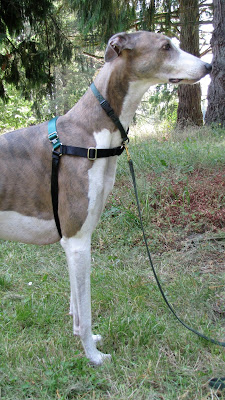However, when he did need to be on leash for socialization, attending puppy class and walking from the car to the door etc, I put him on a front clip harness. This is a harness with a clip in the front instead of up behind the shoulders.
This type of harness makes it more difficult for the dog to pull. When there is pressure on the leash, the dog tends to turn in towards the person holding the leash. This allows the handler to walk without getting pulled and to reward the proper loose leash behavior. It also makes it easier to control the dog if he should lunge after a squirrel/cat/dog/chipmunk.
I have noticed that these harnesses have become quite popular lately. However, many people don't use them properly. I see many dogs pulling quite readily on them and the harnesses are often poorly adjusted. Because the harness is not intended to be used as a pulling harness, letting your dog pull hard and often with this harness could cause damage to their structure.
When fitting this harness, it is very important that the strap across the chest stay up above the point of the elbow. In the picture above, the harness is properly adjusted. In the picture below, the front strap is too low.
When the harness is adjusted improperly as in this picture, in inhibits the shoulder from swinging forward and doesn't allow the dog to extend the front leg. It is uncomfortable for the dog and causes them to shorten their stride. It also makes it possible for the dog to pull their leg out of the harness and escape.
I tried on a couple different brands with Tanner before we found one that fit him well. Due to his big chest and long body, he was not easy to fit. However, Shine, who has a square build, could fit into pretty much any brand. I just had to make sure I adjusted the harness properly. Can you tell if the harness on Shine below is adjusted properly?
This harness is not adjusted properly. The front strap is too loose and too low.
One way to keep the strap from dropping below the point of the shoulder is to connect it to the collar. The front strap will loosen a bit when the dog sits. Even if the harness fits properly when the dog is standing, it will loosen when they sit. Attaching it to the collar holds it up and also adds a little bit of insurance against a possible escape from the harness if you have a spooky dog.
 Which one of these is correct?
Which one of these is correct?The right one! It is up above the point of his shoulder.
The brand that I found fits Tanner best is called the the Wonder Walker. It has a triangular connector on the side which makes the bottom strap sit at an angle and accommodate Tanner's longer body. I have a picture of a different brand with a square connector next to it.


The Wonder Walker also has a ring on top. By centering this ring you can double check that your adjustments are even on both sides. You could also put a leash on it if you didn't want to have it on the front.
Another adjustment you need to watch out for is the looseness when there is pressure on the leash. It is natural for there to be some movement of the ring and clip when there is pressure. However, there shouldn't be this much slack!
Hooking the leash to the collar and harness at the same time does help mitigate this situation. If you have a dog that sometimes pulls on the harness, it can cause the straps to slip in their adjustments and loosen. You should check periodically to make sure the fit is still good.
Here is Tanner with his harness adjusted properly and hooked to his collar. He is ready to go!
We rarely use the front clip harness anymore. Tanner has learned to walk nicely and doesn't really need. I keep it handy just in case we do go someplace super exciting but it is not a part of our daily life anymore.
You can use the front clip as a "crutch" if you don't have the time or patience to train your dog to walk on a loose leash. Many people do use it this way. However, I recommend taking the time to train the behavior you desire. You never know when you will find yourself in a situation where you really need your dog to walk on a loose leash. For example, Tanner and I had an early ring time at at dog show last night. Unfortunately, the parking lot was covered with ice. It was so slick that even a little tug on a front clip would have caused me to lose my balance! I was very thankful that Tanner kept his polite walk even though he was unsettled by the slick surface.
Happy Walking!









